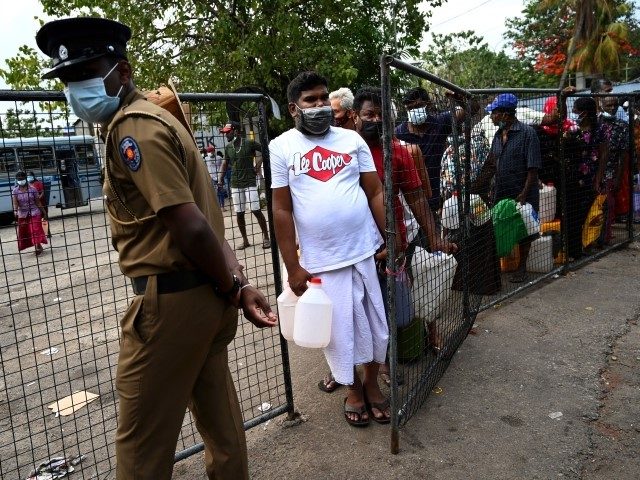The disintegrating government of Sri Lanka on Wednesday announced a ten-hour “water cut” for parts of the commercial capital of Colombo, beginning Saturday at 10:00 p.m.
The water cut will be piled atop daily power outages and fuel shortages as the corrupt socialist government defaults on its debts.
President Gotabaya Rajapaksa continued to defy calls for his resignation as huge protests rolled through the streets. On Tuesday, Rajapaksa’s allies in Parliament managed to delay an opposition motion to condemn him. It was the first parliamentary session convened since the protests turned violent last week.
Rajapaksa’s family members, who formerly held almost every important post in his administration, have all resigned. The last to go was his brother Mahinda, who stood down as prime minister last week. The new prime minister, Ranil Wickremesinghe, gave a televised address on Monday in which he warned Sri Lankans to face the “unpleasant and terrifying facts” of shortages and financial collapse.
“At the moment, we only have petrol stocks for a single day. The next couple of months will be the most difficult ones of our lives,” Wickremesinghe said. “For a short period, our future will be even more difficult than the tough times that we have passed.”
The prime minister said the Sri Lankan central bank would begin printing money to pay government wages, worsening an already severe inflation crisis. He suggested that the state-owned national airline could be privatized as the first step toward emergency reforms.
“Against my own wishes, I am compelled to permit printing money in order to pay state-sector employees and to pay for essential goods and services. However, we must remember that printing money leads to the depreciation of the rupee,” he said.
A Colombo resident told the BBC on Tuesday that most of the city’s gas stations are closed, except for a few stations that provide fuel for government vehicles. Lines at those stations quickly grew to over a mile in length.
“I’m working from home now to try and save fuel because who knows when I’ll get a full tank again,” the Sri Lankan said.
Energy Minister Kanchana Wijesekera told Parliament on Wednesday that the government has no dollar reserves to pay for fuel shipments, leaving a petrol tanker marooned at the port of Colombo since late March.
“We are working to find funds but petrol will not be available at least until the weekend. The very small reserve stock of petrol is being released for essential services like ambulances,” Wijesekera said.
Al Jazeera News on Wednesday warned the next hardship heading at Sri Lanka could be a “man-made food crisis,” since a government ban on chemical fertilizers caused entire crops of rice and bananas to be lost.
One farmer said the forced switch to organic agriculture cut his vegetable yield during the March harvest season from 882 pounds to 110 pounds. Others said they could no longer afford to grow produce for sale and would have to focus on feeding their families, which will be grim news for Sri Lankan city dwellers.
Sri Lanka passed the last-ditch coupon payment date for two of its sovereign bonds on Wednesday, throwing the government into technical default. It was the first sovereign debt default since Sri Lanka gained independence from the United Kingdom in 1948.
Prime Minister Wickremesinghe said Sri Lanka has obtained $160 million in “bridge financing” from the World Bank, but he was not certain if any of the money could be used to pay for fuel. JPMorgan, at least, was willing to back more Sri Lankan government bonds on Wednesday, predicting “political stability” would gradually return to the island.
More pessimistic analysts predicted a string of Third World defaults as economies hollowed out by irresponsible government spending, corruption, and the Wuhan coronavirus pandemic are hit by shockwaves from events like the Russian invasion of Ukraine.
“I’m deeply concerned about developing countries. They are facing sudden price increases for energy, fertilizer and food, and the likelihood of interest rate increases. Each one hits them hard,” World Bank President David Malpass warned last month.
Sri Lanka finds itself crushed by decades of madcap socialist spending, its treasury squandered on bloated and mismanaged state enterprises like the above-mentioned national airline or pocketed by its nepotistic political elite. Easy money from China’s Belt and Road Initiative (BRI) propped up the Rajapaksa regime, leaving Sri Lanka deeply in hock to Chinese banks. When the BRI money ran out, the ruling family was completely unprepared to meet the tougher standards demanded by lenders like the International Monetary Fund (IMF).
That sounds like a story that could play out in any number of other developing countries, especially those hooked on China’s BRI money. BRI projects tend to be money-losers that rack up huge amounts of debt to Chinese banks, which Beijing can leverage for political influence over its client states – a process demonstrated all too clearly in Sri Lanka.

COMMENTS
Please let us know if you're having issues with commenting.